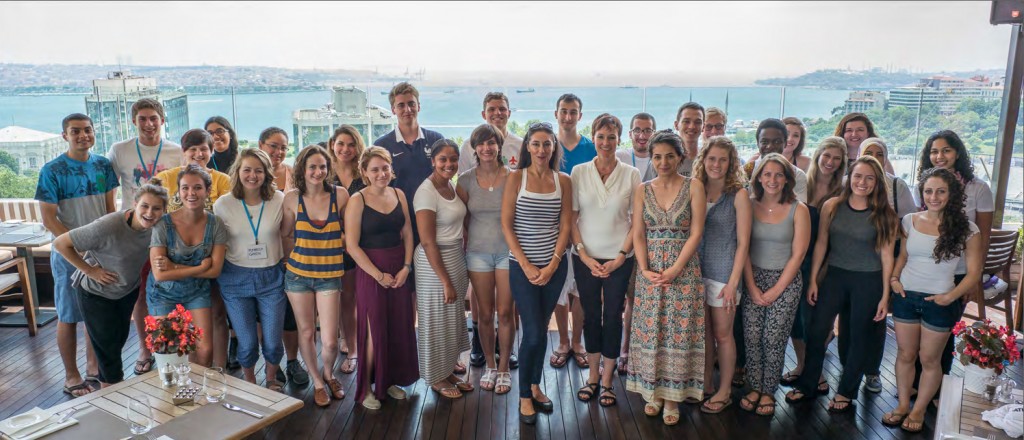
Attendees of the 2015 Scholars Dialogue to Istanbul and Berlin.
The University Scholars Program sponsors the Dialogue of Civilizations "Politics of Space: Islam, Gender, Sexuality in Istanbul and Berlin," led by Professor of Sociology and International Affairs Berna Turam and Associate Professor of Sociology Kathrin Zippel. This dialogue explores controversial issues including politics of the city, religion, gender, sexualities and immigration. It focuses on the Turkish migrant population in Berlin, Germany, in contrast with the accommodation of religion in secular neighborhoods of Istanbul. University Scholars engage with the cities through participant observation, walking tours, and conversations with guest speakers, including those from gender, LGBTQ and migration community organizations. In addition, each student designs and completes an interdisciplinary research project.
This Dialogue is open to Scholars from all fields and comprises the following courses:
INTL4944 - Dialogue of Civilizations: Regional Engagement: This Dialogue course provides students with an in-depth and comprehensive understanding of the contrasting issues surrounding the Turkish migrant population in Berlin, Germany, and the counter understanding of these immigration issues from Istanbul. The program will begin in Istanbul, the largest metropolitan of Turkey. At the cross-roads of Europe, Mediterranean, Central Asia and the Middle East, Turkish politics and culture play an important role as a bridge between major national and regional players of world politics. Istanbul, the former capitol of Byzantium and Ottoman Empires, has hosted many civilizations, and developed a distinct political culture. In addition to these appealing characteristics of Istanbul, we have two distinct academic goals: First, we will explore the politically contested issues surrounding the religiosity, cultural and political integration from the Turkish side/perspective. Second, we will follow the Turkish Muslim immigrants from Istanbul to Berlin and explore how Turks living in Germany reconcile their cultural, political and religious identity. We will trace the linkages (and the absence thereof) between the diaspora and the homeland as well as comparison between the two. We will conduct neighborhood studies in Kreuzberg, and NeuKoelln with other contested neighborhoods of Istanbul, such as Tesvikiye, the secularist neighborhood with a considerable Jewish population and Beyoglu, the most mixed neighborhood that integrates ethnic and religious minorities in Istanbul. Students will conduct participant observation in the selected sites of the neighborhoods and the city, conduct their own fieldwork, and/or conduct informal interviews with Turkish youth living in Germany, while engaging in dialogues with local scholars, politicians, NGO’s, and religious leaders to explore the particular policy issues that surround this immigration situation. This course counts as NU Core arts level 1.
SOCL3471 - Social Conflict & Community Services Abroad: Berlin-Istanbul Politics of Gender and Immigration: Homeland and Hostland: The course is designed as a fieldtrip research course, in which students develop their independent research projects in close collaboration with the Faculty Leaders. The research projects may explore controversial issues of politics of the city, gender, sexualities and immigration. Through participant observation, informal conversations and /or group discussions with the faculty leaders and guest speakers including those from the Turkish-German, gender, LGBTQ and migration community organizations, we will explore the ways in which gender and migration politics are played out in Germany and Turkey as they accommodate Muslim politics with a stable secular democracy. This course provides an interdisciplinary approach to understanding gender in the history, culture, politics, religion, and urban publics of Berlin and Istanbul by locating them into the European, Middle Eastern and world politics. We use a gender lens to understand how the cultures come together and intersect between the two country’s landscape, neighborhoods, societies and politics, German and Turkish. How are both German and Turkish gender politics shaped by intersecting factors of class, religion, ethnicity, nationality, and age? How and why do gender identities and constructions of femininities and masculinities, sexualities and women’s bodies become contested sites between two cultures, German and Turkish? We situate politics of gender into urban and global contexts. How do different historical, social and economic trajectories frame gender issues in different ways in both countries? We will explore how different political institutions, such as the state, the parliament, and the judiciary shape gender and sexual politics. While we will discuss how the European Union integration policies have shaped the national level gender politics, we will also focus on how urban politics reflect gender politics. Berlin with the largest Turkish immigrant community provides the meeting point for women’s and LGBT movement for both Turkish and German social actors. By focusing on the city of Berlin and ethnically concentrated neighborhoods in Berlin, we will examine how gender is negotiated in city politics and contestations of urban space. We will have a specific emphasis on how these contexts shape the ways in which gender is performed in everyday life. For example, visitors are often surprised to see how different forms of secularism in Germany and Turkey are manifested in various forms of the headscarf ban in public service and education.
